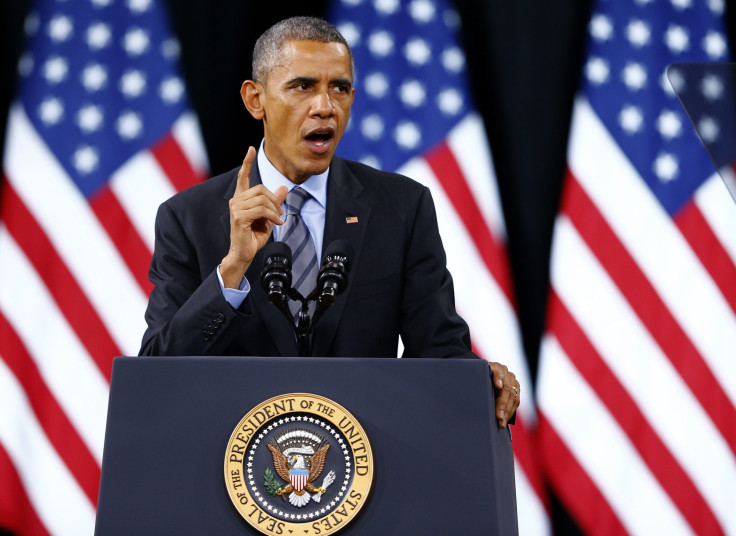Following Executive Action on Immigration, Advocates Fear Onslaught of Scams

Obdulio left behind a factory job in Guatemala for a shot at a better life in Washington. Fourteen years later, he was working in a supermarket -- and still wanted something better.
So, on the recommendation of a friend, Obdulio (who asked that International Business Times identify him only by his middle name) turned to a local businessman he thought he could trust to handle his immigration paperwork. “He told me he could help me,” Obdulio recalls of his first meeting with the man in a suburban Washington office. That night, in June 2012, Obdulio paid the man $1,000 cash and began to fill out forms.
Last month, the same man, Ramon Escarfullet, pleaded guilty to running an immigration fraud scheme that bilked thousands of dollars from clients, and left some facing deportation, Obdulio, who learned of the scheme on the television news, included.
Escarfullet, who is not an attorney, “took a very complex legal process, and grossly misrepresented it, and did not explain to his victims that he was getting them into deportation proceedings with very, very low possibilities of winning,” said Anne Schaufele, Obdulio’s lawyer, who works with the Washington nonprofit Ayuda.
Following President Obama’s executive action on immigration, lawyers and advocates are bracing for more fraud schemes like the one Escarfullet orchestrated. Escarfullet presented himself as a “notario” or legal expert who could help smooth the path to citizenship. Instead, he took advantage of people who had little recourse.
“What we fear the most is, there are going to be unscrupulous offices being set up,” said Raul Raymundo, CEO of The Resurrection Project, a community development organization based in Chicago.
“Anyone who says, ‘We have an application for you to begin filling out,’ is misleading people,” Raymundo said. “Because there is no application.”
Concrete details on the application process under the executive action are not expected until later next year. And while immigration services fraud is an ongoing problem, experts say it tends to worsen during times tinged with both excitement and uncertainty.
“What we’ve seen in the past is that whenever there is an announcement of something new, people have taken advantage of that by saying: If you give me some money now, yours will be the first name on the list,” said Michelle Sardone, legalization program director at Catholic Legal Immigration Network Inc.
Notarios take advantage of a couple factors. In Latin American countries, a “notario público” is an attorney who is qualified to give legal advice, Sardone said.
“It’s a word that often immigrants recognize from home, and think it’s someone who may be an expert, when really they’re not,” she said. “That’s out and out fraud.”
Often, a notario seems like a trusted member of the community, someone who may well run another local business. Escarfullet, for example, provided tax preparation services. Then he’d hand customers a flyer touting his immigration services, too. “The clients who had been trusting him with their taxes, were like, 'This is great,'” Schaufele said.
“Especially with the notario type of scam, it’s an affinity fraud,” said Monica Vaca, assistant director with the Federal Trade Commission’s division of marketing practices. “It’s someone within their own community who is committing the fraud.”
Earlier this year, the Federal Trade Commission won a $616,000 judgment against a Baltimore couple, Manuel and Lola Alban, over deceptive immigration services. The Albans also offered tax preparation services, and, at one point, ran a local Spanish-language newspaper. The court determined that out of some 600 immigration applications the couple submitted for clients, more than 60 percent were denied or rejected. Several clients were deported and one was jailed.
In addition to notario frauds, Vaca said “impostor” government websites are another common scam. “They’ll charge people for forms that are available for free from the government,” she said.
The agency registered 891 complaints related to immigration services fraud in 2013. Those complaints allow the FTC to identify patterns and build cases, and the database is also accessible to local law enforcement agencies. But underreporting is a concern.
“This is something that we worry about,” Vaca said. “We know from talking with advocates that often times people don’t go to the government for help because they’re worried about contacting the government. It may not be a positive thing for them.”
Notarios issue their own threats, too. “Immigrants are an easy target,” said Reid Trautz of the American Immigration Lawyers Association, which runs a campaign against notario fraud. “Because you can take their money, and if they try to come after you, you can say. 'I’m going to call the authorities and have you deported.'”
The organization has also advocated for more cohesive enforcement and oversight at the federal level. “There is a patchwork of enforcement agencies that handle this,” Trautz said. “There is no one agency, or one group, in charge.”
For now, advocates say they are focused on education and outreach to immigrant communities about the executive order. “Our affiliates are saying: You can’t apply yet, but here’s what you can do to start preparing,” Sardone said. Their advice includes gathering documents, and saving money for the application fee.
If immigrants do seek expert advice now, Sardone said, they should either find an attorney, and make sure that attorney is a member of the state bar, or identify a representative who is accredited by the U.S. Board of Immigration Appeals.
© Copyright IBTimes 2024. All rights reserved.





















